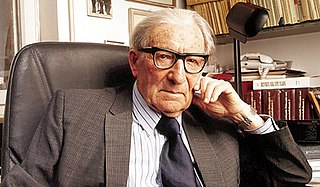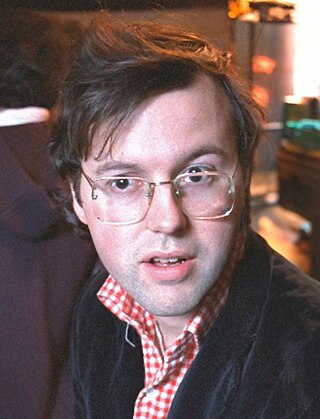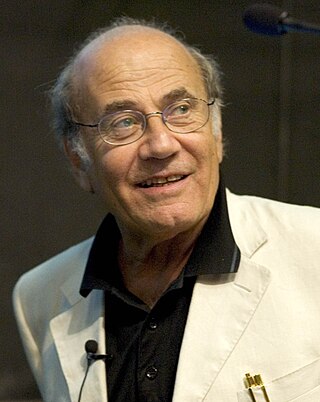Related Research Articles
The Copenhagen interpretation is a collection of views about the meaning of quantum mechanics, stemming from the work of Niels Bohr, Werner Heisenberg, Max Born, and others. While "Copenhagen" refers to the Danish city, the use as an "interpretation" was apparently coined by Heisenberg during the 1950s to refer to ideas developed in the 1925–1927 period, glossing over his disagreements with Bohr. Consequently, there is no definitive historical statement of what the interpretation entails.

The many-worlds interpretation (MWI) is a philosophical position about how the mathematics used in quantum mechanics relates to physical reality. It asserts that the universal wavefunction is objectively real, and that there is no wave function collapse. This implies that all possible outcomes of quantum measurements are physically realized in some "world" or universe. In contrast to some other interpretations, the evolution of reality as a whole in MWI is rigidly deterministic and local. Many-worlds is also called the relative state formulation or the Everett interpretation, after physicist Hugh Everett, who first proposed it in 1957. Bryce DeWitt popularized the formulation and named it many-worlds in the 1970s.
An interpretation of quantum mechanics is an attempt to explain how the mathematical theory of quantum mechanics might correspond to experienced reality. Although quantum mechanics has held up to rigorous and extremely precise tests in an extraordinarily broad range of experiments, there exist a number of contending schools of thought over their interpretation. These views on interpretation differ on such fundamental questions as whether quantum mechanics is deterministic or stochastic, local or non-local, which elements of quantum mechanics can be considered real, and what the nature of measurement is, among other matters.
In philosophy, the philosophy of physics deals with conceptual and interpretational issues in modern physics, many of which overlap with research done by certain kinds of theoretical physicists. Historically, philosophers of physics have engaged with questions such as the nature of space, time, matter and the laws that govern their interactions, as well as the epistemological and ontological basis of the theories used by practicing physicists. The discipline draws upon insights from various areas of philosophy, including metaphysics, epistemology, and philosophy of science, while also engaging with the latest developments in theoretical and experimental physics.

John Stewart Bell FRS was a physicist from Northern Ireland and the originator of Bell's theorem, an important theorem in quantum physics regarding hidden-variable theories.

Jean-Pierre Vigier was a French theoretical physicist, known for his work on the foundations of physics, in particular on his stochastic interpretation of quantum physics.

Gerardus (Gerard) ’t Hooft is a Dutch theoretical physicist and professor at Utrecht University, the Netherlands. He shared the 1999 Nobel Prize in Physics with his thesis advisor Martinus J. G. Veltman "for elucidating the quantum structure of electroweak interactions".
William "Bill" Kent Wootters is an American theoretical physicist, and one of the founders of the field of quantum information theory. In a 1982 joint paper with Wojciech H. Zurek, Wootters proved the no cloning theorem, at the same time as Dennis Dieks, and independently of James L. Park who had formulated the no-cloning theorem in 1970. He is known for his contributions to the theory of quantum entanglement including quantitative measures of it, entanglement-assisted communication and entanglement distillation. The term qubit, denoting the basic unit of quantum information, originated in a conversation between Wootters and Benjamin Schumacher in 1992.

Max Jammer, was an Israeli physicist and philosopher of physics. He was born in Berlin, Germany. He was Rector and Acting President at Bar-Ilan University from 1967 to 1977.
Dirk ter Haar FRSE FIP DSc was an Anglo-Dutch physicist.
There is a diversity of views that propose interpretations of quantum mechanics. They vary in how many physicists accept or reject them. An interpretation of quantum mechanics is a conceptual scheme that proposes to relate the mathematical formalism to the physical phenomena of interest. The present article is about those interpretations which, independently of their intrinsic value, remain today less known, or are simply less debated by the scientific community, for different reasons.

Jeremy Nicholas Butterfield FBA is a philosopher at the University of Cambridge, noted particularly for his work on philosophical aspects of quantum theory, relativity theory and classical mechanics.
Dipankar Home is an Indian theoretical physicist at Bose Institute, Kolkata. He works on the fundamental aspects of quantum mechanics, including quantum entanglement and Quantum communication. He is co-author with Partha Ghose of the popular book Riddles in your Teacup - Fun with Everyday Scientific Puzzles.
Geoffrey Hellman is an American professor and philosopher. He is Professor of Philosophy at the University of Minnesota in Minneapolis, Minnesota. He obtained his B.A. (1965) and Ph.D. (1972) degrees in philosophy from Harvard University. He was elected to the American Academy of Arts and Sciences in 2007.
James Thomas Cushing was an American theoretical physicist and philosopher of science. He was professor of physics as well as professor of philosophy at the University of Notre Dame.
Robert Weingard was a philosopher of science and professor of philosophy at Rutgers University.

Simon Wolfe Saunders is a British philosopher of physics. He is noted for his work on quantum mechanics, on identity and indiscernibility in physics, and on structural realism.

In physics and the philosophy of physics, quantum Bayesianism is a collection of related approaches to the interpretation of quantum mechanics, the most prominent of which is QBism. QBism is an interpretation that takes an agent's actions and experiences as the central concerns of the theory. QBism deals with common questions in the interpretation of quantum theory about the nature of wavefunction superposition, quantum measurement, and entanglement. According to QBism, many, but not all, aspects of the quantum formalism are subjective in nature. For example, in this interpretation, a quantum state is not an element of reality—instead, it represents the degrees of belief an agent has about the possible outcomes of measurements. For this reason, some philosophers of science have deemed QBism a form of anti-realism. The originators of the interpretation disagree with this characterization, proposing instead that the theory more properly aligns with a kind of realism they call "participatory realism", wherein reality consists of more than can be captured by any putative third-person account of it.
Nicolaas 'Nico' Godfried van Kampen was a Dutch theoretical physicist, who worked mainly on statistical mechanics and non-equilibrium thermodynamics.

Giancarlo Ghirardi was an Italian physicist and emeritus professor of theoretical physics at the University of Trieste.
References
- ↑ D. Dieks, "Communication by EPR devices", Physics Letters A 92 (1982) 271–272.
- ↑ D. Dieks, "Resolution of the Measurement Problem Through Decoherence of the Quantum State", Physics Letters A 142 (1989) 439-444.
- ↑ Dennis Dieks and Pieter E. Vermaas, eds., The Modal Interpretation of Quantum Mechanics, Kluwer Academic Publishers, 1998.
- ↑ "Dennis Dieks" (in Dutch). Royal Netherlands Academy of Arts and Sciences. Retrieved 13 July 2015.
- ↑ "Dennis Dieks, winnaar Langerhuizen Oeuvreprijs 2024" (in Dutch). Retrieved 28 May 2024.
- ↑ "Dennis Dieks - Chess Games". chesstempo.com. Retrieved 2019-01-22.
- ↑ "The chess games of Dennis Dieks". www.chessgames.com. Retrieved 2019-01-22.